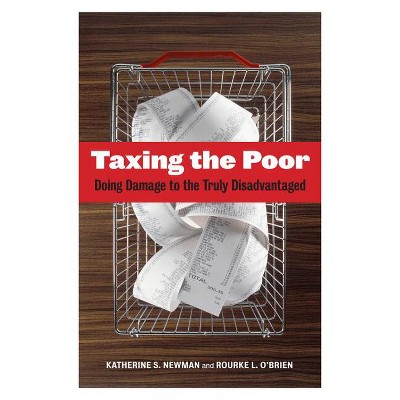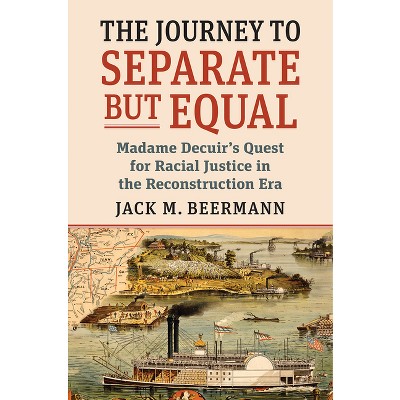$115.00 when purchased online
Target Online store #3991
About this item
Highlights
- This open access book examines how civic organizations can influence tax policy and administration in ways that benefit ordinary citizens, through in-depth case studies from a wide range of countries including France, Guatemala, Kenya, Mexico, Philippines, Uganda, and the United States.
- About the Author: Paolo de Renzio is Senior Lecturer at the Brazilian School of Public and Business Administration of Fundação Getúlio Vargas (EBAPE/FGV) in Rio de Janeiro, Brazil.
- 240 Pages
- Business + Money Management, Taxation
Description
About the Book
"This open access book examines how civic organizations can influence tax policy and administration in ways that benefit ordinary citizens, through in-depth case studies from a wide range of countries including France, Guatemala, Kenya, Mexico, Philippines, Uganda, and the United States. These cases demonstrate the ways in which civic coalitions have crafted convincing narratives and used creative strategies to change the political incentives of policymakers and yield more equitable tax reform. The cases cover a wide range of types of tax reform, from taxes on specific items like fuel, tobacco and mobile money applications, to personal and corporate income taxes. They also highlight the use of a variety of approaches by civic actors-such as media campaigns, advocacy with legislators, and strategic litigation-to influence policy. These examples, covering a range of lower and higher income countries, across many aspects of tax systems, give us useful examples to build on, demonstrating that citizens everywhere can influence tax policy and ultimately secure fairer societies"--Book Synopsis
This open access book examines how civic organizations can influence tax policy and administration in ways that benefit ordinary citizens, through in-depth case studies from a wide range of countries including France, Guatemala, Kenya, Mexico, Philippines, Uganda, and the United States. These cases demonstrate the ways in which civic coalitions have crafted convincing narratives and used creative strategies to change the political incentives of policymakers and yield more equitable tax reform. The cases cover a wide range of types of tax reform, from taxes on specific items like fuel, tobacco and mobile money applications, to personal and corporate income taxes. They also highlight the use of a variety of approaches by civic actors-such as media campaigns, advocacy with legislators, and strategic litigation-to influence policy. These examples, covering a range of lower and higher income countries, across many aspects of tax systems, give us useful examples to build on, demonstrating that citizens everywhere can influence tax policy and ultimately secure fairer societies.The ebook editions of this book are available open access under a CC BY 4.0 licence on www.bloomsburycollections.com.
Review Quotes
Taxation is at the heart of governance, yet equitable tax reform is a daunting challenge. This authoritative study, drawing on cases across the globe, unpacks the creative strategies used by citizen groups. What coalitions do they form? What capacities do they need? When--and why--do they sometimes succeed? With rich, detailed narratives, this book provides a pathbreaking analysis of this vital subject.
Deborah Brautigam, Bernard L. Schwartz Professor of International Political Economy Emerita, Johns Hopkins University, School of Advanced International Studies, USA
Through a series of careful case studies covering a range of lower and higher income countries, A Taxing Journey highlights the role of civil society organizations (CSOs) in effecting tax reform, elucidating an often important but understudied aspect of the political economy of tax reform. By showing how civic activism around tax works-and sometimes does not work--it offers useful lessons for CSOs interested in getting involved in tax issues by highlighting the use of a variety of approaches, such as media campaigns and advocacy with legislators, to influence policy. It should be essential reading for would-be tax reformers around the world.
Joel Slemrod, David Bradford Distinguished University Professor of Economics at the University of Michigan, USA
About the Author
Paolo de Renzio is Senior Lecturer at the Brazilian School of Public and Business Administration of Fundação Getúlio Vargas (EBAPE/FGV) in Rio de Janeiro, Brazil. He has published in various academic journals and co-edited a book called Open Budgets: The Political Economy of Transparency, Participation and Accountability (2013).Dimensions (Overall): 9.21 Inches (H) x 6.14 Inches (W) x .56 Inches (D)
Weight: 1.13 Pounds
Suggested Age: 22 Years and Up
Number of Pages: 240
Genre: Business + Money Management
Sub-Genre: Taxation
Publisher: Bloomsbury Publishing PLC
Theme: General
Format: Hardcover
Author: Paolo de Renzio
Language: English
Street Date: January 25, 2024
TCIN: 94328109
UPC: 9781350344617
Item Number (DPCI): 247-51-1220
Origin: Made in the USA or Imported
Shipping details
Estimated ship dimensions: 0.56 inches length x 6.14 inches width x 9.21 inches height
Estimated ship weight: 1.13 pounds
We regret that this item cannot be shipped to PO Boxes.
This item cannot be shipped to the following locations: American Samoa (see also separate entry under AS), Guam (see also separate entry under GU), Northern Mariana Islands, Puerto Rico (see also separate entry under PR), United States Minor Outlying Islands, Virgin Islands, U.S., APO/FPO
Return details
This item can be returned to any Target store or Target.com.
This item must be returned within 90 days of the date it was purchased in store, shipped, delivered by a Shipt shopper, or made ready for pickup.
See the return policy for complete information.












